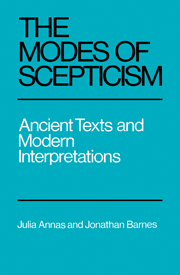Book contents
- Frontmatter
- Contents
- Preface
- Introduction
- 1 Sceptical Philosophy
- 2 Scepticism in Ancient Philosophy
- 3 The Ten Modes
- 4 Humans and Other Animals
- 5 Human Variations
- 6 The Senses
- 7 Circumstances
- 8 Places and Positions
- 9 Mixtures
- 10 Quantities
- 11 Relativity
- 12 The Common and the Rare
- 13 Customs and Persuasions
- Appendix A Philo and Diogenes on the Modes
- Appendix B The Eight Modes against Causal Explanation (Sextus, PHI 180–5)
- Appendix C The Five Modes of Agrippa (Sextus, PHI 164–9)
- Appendix D The Two Modes (Sextus, PHI 178–9)
- Appendix E Textual Notes
- Glossary
- Bibliography
- Index of People Referred to
- Index of Topics
2 - Scepticism in Ancient Philosophy
Published online by Cambridge University Press: 06 January 2010
- Frontmatter
- Contents
- Preface
- Introduction
- 1 Sceptical Philosophy
- 2 Scepticism in Ancient Philosophy
- 3 The Ten Modes
- 4 Humans and Other Animals
- 5 Human Variations
- 6 The Senses
- 7 Circumstances
- 8 Places and Positions
- 9 Mixtures
- 10 Quantities
- 11 Relativity
- 12 The Common and the Rare
- 13 Customs and Persuasions
- Appendix A Philo and Diogenes on the Modes
- Appendix B The Eight Modes against Causal Explanation (Sextus, PHI 180–5)
- Appendix C The Five Modes of Agrippa (Sextus, PHI 164–9)
- Appendix D The Two Modes (Sextus, PHI 178–9)
- Appendix E Textual Notes
- Glossary
- Bibliography
- Index of People Referred to
- Index of Topics
Summary
For us, as for Descartes and his contemporaries, Sextus Empiricus is the chief representative of ancient scepticism. But Sextus was the heir to a long tradition which the sceptics themselves liked to trace back to the very beginnings of Greek philosophy. The sceptical tradition, unlike its rivals, never hardened into a school. In the Golden Age of Greek thought, from about 400 BC to about 100 BC, the chief dogmatic philosophies – Platonism, Aristotelianism, Stoicism, Epicureanism – were to some extent institutionalised. They were marked by characteristic doctrines and distinctive ideologies. They enjoyed some measure of formal organisation. They functioned as educational establishments. They had official heads or ‘scholarchs’. They owned property. The history of scepticism, one episode excepted, is not like that. Leading sceptics had associates and pupils, and they were aware of their predecessors. Sceptical attitudes and arguments were transmitted from one generation to the next. But by its very nature scepticism could profess no school doctrines, and its adherents did not hanker after the institutional trappings or the professional status of the dogmatic sects. Greek scepticism has a history, but it is informal and discontinuous.
The later sceptics called themselves Pyrrhonians, ‘from the fact that Pyrrho appears to us to have applied himself to scepticism more thoroughly and more conspicuously than his predecessors’ (Sextus, Outlines of Pyrrhonism 17). Pyrrho of Elis is for us a shadowy figure. He lived from about 360 BC to about 270 BC.
- Type
- Chapter
- Information
- The Modes of ScepticismAncient Texts and Modern Interpretations, pp. 10 - 18Publisher: Cambridge University PressPrint publication year: 1985



